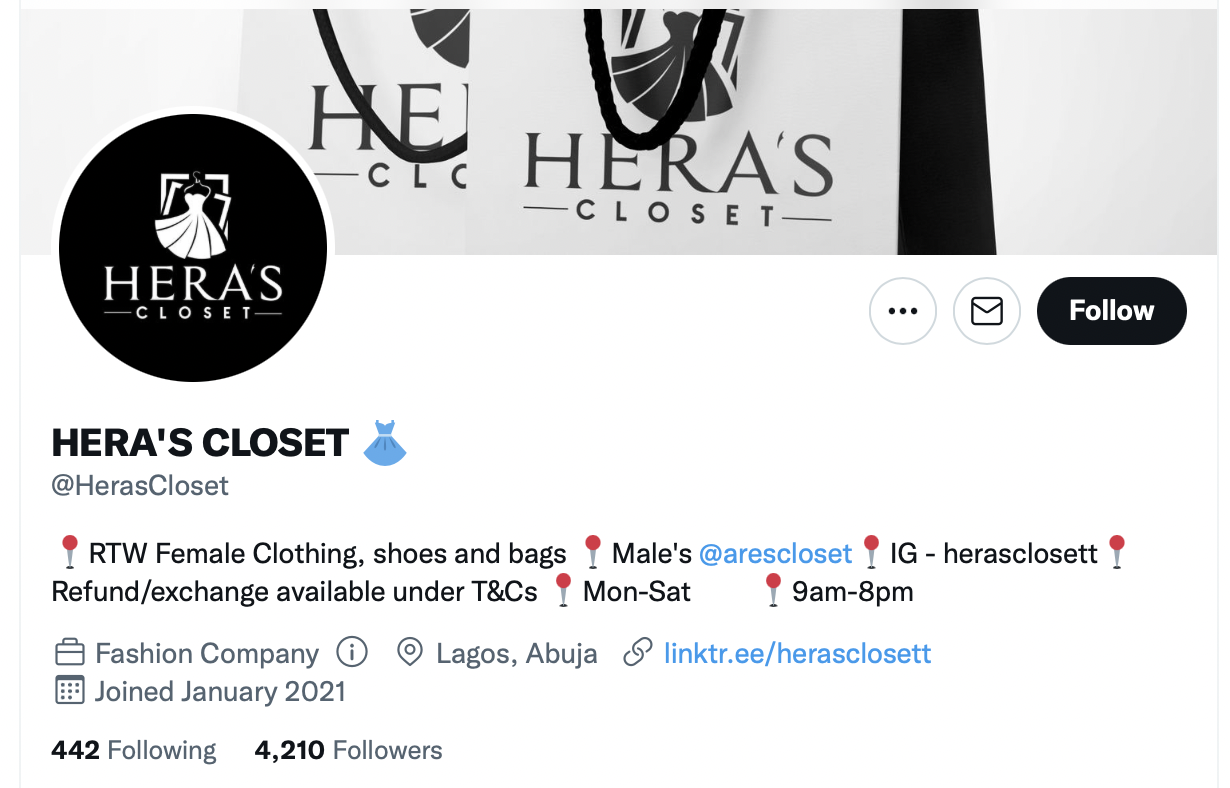Hyelhirra Samaila, a student of the Ahmadu Bello University, Zaria, got tired of spending so much time on social media during the strike in 2020 and decided to leverage her platform to sell clothes. She already had a lot of online friends and figured that she could get them to buy a couple of clothes from her. She started Hera’s closet on Twitter, where she posted pictures of trendy female clothes for sale. In less than 2 years, this business has sold hundreds of articles of clothing, gathered over 4,000 followers and is now a popular choice for a lot of people on the app. Samaila is not alone; a large number of people in Nigeria are setting up businesses on social media and utilising their online presence to make extra income.
Like the rest of the world, Nigeria also witnessed a spike in e-commerce activities during the 2020 lockdown as online sales of food and personal care products rose by about 60%. But Nigerians spend the longest amount of time on social media daily compared to any other country, and so there were an estimated 76 million online shoppers in Nigeria, the majority of whom shopped predominantly on Facebook and Instagram. Although the lockdown is over, the shopping habits picked up still persist. Social commerce, which is the buying and selling of goods directly over social media, is garnering attention in the country and reports show that this industry is expected to witness even more growth by the end of 2022.

Stories that touch: what I ordered vs what I got
Despite this sector’s growth, many buyers on social media do not trust social commerce and often see it as a game of chance or a last resort. For example, Oyiza, a student at Bingham university, does most of her shopping online as her school has strict rules about leaving the campus.
“The thing with shopping on social media is that you have to give space for luck. Sometimes, what I get is just what I ordered and other times, what I order online is totally different from what arrives. Still, I guess that’s better than the vendor ghosting you after receiving your payment,” she shares.
“I’ve had experiences where the vendors just did not send in my orders. They stop responding to you or they block you outrightly. There are things I just won’t buy online, things that are expensive like wigs and jewellery because I’m scared of being scammed. If you’re lucky, you can make a report at the bank and have them reverse your money, but if you’re not, your money is gone.”
Oyiza’s fear is not misplaced as social media is rife with purchase scams. This report includes a survey in which about 24% of respondents admit to being scammed while shopping on social media. While social media platforms are convenient for shopping, there is a trust barrier as even frequent shoppers are wary of the process. This affects other vendors who have to spend a lot of time assuring potential customers before closing transactions.
The question now is: what will it take to protect Nigerian buyers’ trust in social commerce?
Business Acumen
Dammy B is popular on Twitter for her commitment to helping vendors grow their small businesses. She shops on social media frequently and what started as what she likes to call a shopping problem, evolved into an active desire to help these vendors.
“Many of them started selling on social media not because they’re growing a brand, but because of the economic situation. Most people are selling because they’re trying to find things to do while on strike or as a hustle or side hustle,” Dammy told TechCabal. “They started business on a whim and so they are missing a lot of knowledge on how to successfully run a business, from customer service, a basic understanding of books etc.”
Dammy has an MBA and uses her knowledge to break down useful business concepts and tips to vendors in ways they can easily implement. This has been helpful to the hundreds of vendors she works with, who now have been able to get more reach and experience less friction with customers as a result.

Transparency and Relatable/Personalised Business Presence
“I only buy on social media when I know the vendor. If I don’t know you or know someone who knows you, I’m not parting with my money,” Sani, a doctor in Makurdi, shared with TechCabal.
For some shoppers, one of the appeals of social commerce is direct interaction. Hafsat, a student who lives in Abuja and regularly buys from Instagram and WhatsApp, said: “I like buying from WhatsApp and Instagram when I get to see the vendors and what they’re like. I enjoy being able to have one-on-one conversations with the vendors and that makes the experience feel more personal and reassuring.”
Precious, a teacher in Zaria, shares the same sentiments with Hafsat. “I prefer buying where I can talk directly with the sellers. Sometimes, I have questions to ask and they answer me. I can also negotiate with sellers; sometimes I want the items delivered earlier or in a special condition, and I can get that with vendors.”
“Another thing is that these platforms [Jumia and Konga] need you to add so many details to sign up. With social media, I can just transfer my money directly and send them my address,” she added.
This strategy of humanising your brand is one that a lot of vendors employ. According to Habiba Gado, owner of Sucreliz Accessories, the one way she attracts customers is by being relatable on her page. She posts videos where she tells her followers about herself. “They feel like they know me when they come to my page, and that inspires the trust and enthusiasm that they need to purchase my products,” she told TechCabal.
Samaila of Hera’s Closet agrees with this and believes that putting a face to your brand improves your chances of success in social commerce. “When people know you, it becomes easier for them to associate you and your brand. They believe it gives them some leverage and can call you out in case you disappoint them.”
Speaking as an ardent shopper herself, Dammy B said that there are things she always looks out for that influence her decision to patronise a particular vendor.
“I check to see if they have live photos first and foremost. If they don’t, I request it. From the live photos, I can decide whether or not I like the quality enough to patronise the vendor. Seeing other people who have patronised the vendor post pictures and reviews also inspires trust in me and makes me believe the vendor is genuine.”

However, some of the problems inspiring the mistrust in social commerce are structural challenges that the vendors really can’t help.
Joshua, a student who lives in Lagos, doesn’t “necessarily enjoy buying from social media vendors because they always have logistics issues. Larger retail companies have a handle on their logistics and my items get delivered to me smoothly.”
While logistics, especially last-mile delivery, is a big problem in Nigeria for social media vendors and e-commerce merchants alike, e-commerce companies have enough money to minimise the inefficiencies. Unlike them, social media vendors often act as their own delivery agents or they have to depend on smaller and less efficient logistics companies.
Beyond Vendors’ Capacity: what social media platforms can do
Social media platforms are aware of how advantageous social commerce is for them and are ramping up their commerce strategies. In 2021, Facebook opened up its marketplace feature to Nigerians and according to Adaora Ikenze, the company’s head of public policy for Anglophone Africa, the move accompanied a spike in shopping activities by Nigerians on the platform.
For Twitter, there is still much left to be desired. Dammy B thinks that while Twitter does a great job with ad placements, their data use can be much more effective. “If someone was talking about bags, for example, it would help if the algorithm pushes posts of bags to that person’s timeline. This is something that Instagram gets right. It keeps recommending products to you from whatever data it learns about you.”



















